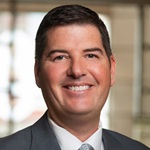Neal’s Story: ‘I Couldn’t Be Happier with the Result’
Click play to watch the video or read video transcript.
When Neal Gittleman injured one of Dayton’s most famous shoulders while playing squash, he faced a tough choice familiar to many athletes and aging residents across Southwest Ohio: leave well enough alone, or opt for surgery?
Neal has conducted the Dayton Philharmonic Orchestra since 1995. His torn rotator cuff wouldn’t necessarily be a fatal blow to his career, but ignoring the injury might allow it to worsen, leaving him with no choice but to undergo a shoulder replacement.
“It didn’t stop me from working, but there were definitely things that I couldn’t do with the same abandon and naturalness,” he says. “In the back of my mind, I was thinking, ‘Is this going to hurt when I do this?’”
While making music with 83 other people, Neal says he couldn’t afford to be preoccupied by pain or let it compromise his conducting.
“You are the mirror in which the musicians see the music. When they look up at you, they have to see the music in you,” says Neal. He stretched out his arm to show how a torn rotator cuff limited his range of motion. “There are many ways of getting that result, but if you feel that you need to do this, and your body’s only letting you do that, then you either have to live with it or you have to figure out a way to fix it.”
Race Against Time
Neal chose to fix it. An MRI revealed that Neal had a complete tear inside his right rotator cuff, as well as bone spurs inside the shoulder and a torn bicep tendon. His family physician referred him to Michael Herbenick, MD, an orthopedic surgeon specializing in sports medicine at Premier Orthopedics, part of Premier Physician Network.
Dr. Herbenick discussed an outpatient procedure called an arthroscopic rotator cuff repair, which has a high success rate. But it is not without risk, especially during the rehabilitation process.
“If someone gets stiff postoperatively, they can have trouble regaining motion above the shoulder level as a result of scar tissue,” says Dr. Herbenick. That means patients must be disciplined in their rehabilitation.
“If somebody is on the fence, I typically tell them to go back home and think about it for a while,” he adds. “Is this truly worth it to you?”
For Neal, it was. But his recovery would be a race against time. He injured his shoulder in January 2016, tolerating the pain through the remainder of the Philharmonic’s season. His final concert was May 29. He underwent surgery on June 1, with a goal to heal in time for a mid-September concert, the first of the 2016-17 season.
The hour-long surgery was a success. Neal felt little pain in the days following the procedure. Recovery was slow, but a friend who had undergone similar surgery gave him advice that he found to be true: patience and perseverance eventually turns incremental progress into big leaps.
Taking Up the Baton – and Squash?
Neal described himself as “fanatical” in maintaining his therapy regimen. He felt his range of motion and strength return bit by bit, and he did, in fact, take up his baton in time for that September concert.
Afterward, his arm felt sore. Pre-concert warmups and post-concert ice became a must for him from then on. He compiled a kit of weights and a resistance band that he keeps at the Schuster Performing Arts Center.
Neal credits those exercises with putting him within striking distance of his pre-injury strength. He’s eyeing more years of conducting, and maybe even a return to the squash court.
“Everyone at Premier Health was great to me,” says Neal. “The surgery went wonderfully. Everything happened exactly the way they said it would happen. They got me back to the way I needed to be when I needed to be there. I couldn’t be happier with the result.”

Contact Us
Our specialists are ready to help you get back to the things that matter most in your life. Find a provider near you, consult our list of related practices, or find an orthopedic physical therapist near you.
Our specialists are affiliated with:


